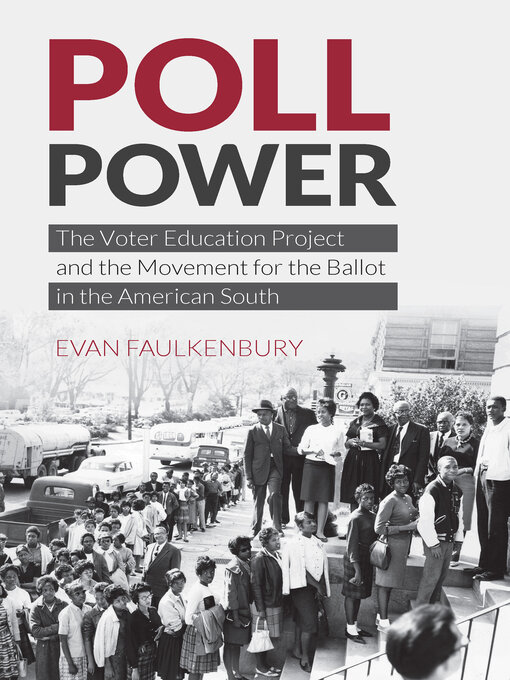Poll Power
The Voter Education Project and the Movement for the Ballot in the American South
Though local power had long existed in the hundreds of southern towns and cities that saw organized civil rights action, the VEP was vital to converting that power into political motion. Evan Faulkenbury offers a much-needed explanation of how philanthropic foundations, outside funding, and tax policy shaped the southern black freedom movement.
-
Creators
-
Series
-
Publisher
-
Release date
April 10, 2019 -
Formats
-
Kindle Book
- ISBN: 9781469651323
-
OverDrive Read
- ISBN: 9781469651330
-
EPUB ebook
- ISBN: 9781469651330
- File size: 6596 KB
-
-
Languages
- English
-
Reviews
-
Library Journal
Starred review from April 1, 2019
Faulkenbury's (history, SUNY Cortland) original work on familiar and lesser-known civil rights activists, on the ground in the North and South before, during, and after the Voting Rights Act of 1965, successfully captures how the civil rights movement evolved from one of demonstrations to one that influenced and registered voters. Based on his graduate studies at the University of North Carolina at Chapel Hill and relying on extensive archival work and oral histories, this work demonstrates the reach of the Voter Education Project (VEP) and grassroots organizing. Though Abraham Lincoln's Emancipation Proclamation signaled the formal end of slavery, white supremacy and Jim Crow laws blocked the implementation of the 15th Amendment. It wasn't until the late 1950s and early 1960s that the VEP was established to help African Americans register to vote. Faulkenbury excels at showing how interactions among organizations in the North helped fund activists in the South, and how the Tax Reform Act of 1969 undermined further progress and ultimately led to the end of the VEP. VERDICT The well-written volume of original scholarship will appeal primarily to researchers interested in the civil rights movement.--William D. Pederson, Louisiana State Univ., Shreveport
Copyright 2019 Library Journal, LLC Used with permission.
-
subjects
Languages
- English
Loading
Why is availability limited?
×Availability can change throughout the month based on the library's budget. You can still place a hold on the title, and your hold will be automatically filled as soon as the title is available again.
The Kindle Book format for this title is not supported on:
×- - Kindle 1
- - Kindle 2
- - Kindle 4
- - Kindle 5
- - Kindle 7
- - Kindle DX
- - Kindle Keyboard
- - Kindle Paperwhite
- - Kindle Touch
- - Kindle Voyage
Read-along ebook
×The OverDrive Read format of this ebook has professional narration that plays while you read in your browser. Learn more here.

